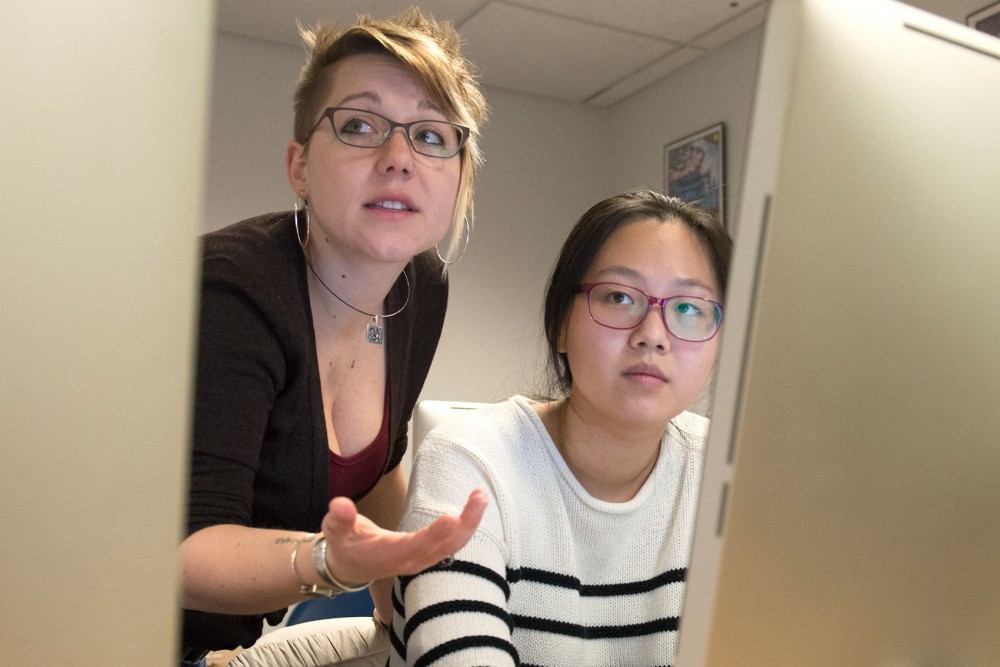While most students with disabilities have no problem giving their professors accommodation letters to get the extra help they need, some experience issues in the process.
Now, a small coalition is asking students with disabilities how they are treated in class and why some opt out of asking for accommodations entirely, including Emily Ehlinger, graduate student and researcher in the University of Minnesota’s Department of Organizational Leadership, Policy and Development.
“I became interested in the data on how few students disclose their disability when they come to college,” Ehlinger said. “There is national data that suggests it might be as little as a third of students who receive special education in high school go on to disclose a disability in college.”
Students might hold back disability information in their classes for a variety of reasons, Ehlinger said. They may have difficulty accessing resources, feel stigmatized by peers or encounter professors who are hesitant to accommodate them.
“Some students are having to share really personal information and medical history about themselves that isn’t expected from other students,” Ehlinger said. “Literature identifies that students feel some discomfort about having to reveal something that personal, even if it’s just an accommodation letter.”
While students aren’t required to tell their professor specifics about their disability, sometimes just expressing their needs can be uncomfortable, she said.
Ehlinger said she wants to compare these challenges to a method called Universal Design and ask students if they could benefit from a similar system.
Some colleges and universities use Universal Design to make courses, buildings and classroom dynamics accessible to all students in order to cut the need for individual accommodations.
Universal Design started after the Americans with Disabilities Act was passed in 1990, said Jeanne Higbee, a retired University researcher and professor who published a paper on the subject in 2003.
“It started in architecture,” Higbee said. “In 1990, all kinds of public institutions were hustling around trying to figure out how to become compliant with that legislation. That was when we started seeing ramps going up.”
She said the idea caught on with some educators, and they started designing classrooms with Universal Design in mind.
University students can go to the Disability Resource Center for individual accommodation letters that help them get resources like note-takers or extended test time.
“The purpose of disability accommodations are to provide a level playing field for the student with a disability,” said Donna Johnson, director of the DRC.
Students have requested more and more in recent years, Johnson said.
Last year the center helped more than 2,300 students, working with them and their professors to write accommodation letters for each of their classes without compromising essential elements of the course, she said.
However, Higbee’s and Ehlinger’s research efforts both show that a Universal Design policy at the University may make these accommodations obsolete.
Higbee said the University of Minnesota has fallen behind other schools in implementing Universal Design.
“There are universities that are focused on implementing [Universal Design], but the ‘U’ is not doing that,” she said. “If you asked professors at the ‘U’ if they knew what Universal Design was, they probably wouldn’t know what it is. But that’s not the case in many other places.”
Director of general chemistry and associate professor Michelle Driessen teaches large first-year classes and said she gets about 30 accommodation letters each semester.
Driessen said the University would benefit from Universal Design because many students feel uncomfortable disclosing their disabilities in class, and there are likely professors who make students afraid to ask for the help.
Issues with accommodations
Gender, Women and Sexuality instructor and graduate student Angela Carter said her students are open with her about their disabilities because she talks about her own disability with students on the first day of class.
Carter said some students with nonapparent disabilities — like depression or anxiety — come to her if other professors question their accommodations.
“They have professors who ask questions and try to negotiate out of accommodations,” she said. “And it makes students uncomfortable to argue with them. But the DRC is there to mediate.”
Students and professors have raised concerns over classroom barriers to students with disabilities that don’t have a simple solution.
Driessen, for example, said most accommodations for her students include extra time for testing. She said students usually go to the DRC to take tests, but have to take them the same day as classmates to avoid cheating.
However, many undergraduate science classes schedule tests at 9 p.m. on Wednesday, while the DRC closes at 6 p.m., she said.
“We also have a conference room in the department set aside for students to take their tests,” Driessen said. “But if they do use the room, they’re sort of outing themselves to other students who are using disability resources.”
She said some students ask her mid-semester whether it is alright for them to start using accommodations.
“I know there are students who feel like they are going to be stigmatized if they come in and say, ‘I need these accommodations,’ ” Driessen said. “But when I say I do this for a lot of students, they relax. So I am guessing there are faculty who are maybe not so friendly about this.”
The DRC has a website where students can file complaints about professors unwilling to meet accommodation requests, and they are encouraged to talk with DRC staff if the problems persist.
Still, some students fear backlash from professors and end up saying nothing or drop classes, Carter said.
She said her willingness to identify with her disability in class is a political decision to reduce stigmas students feel and attempt to make them more comfortable.
Carter said she structures teaching methods to be accessible and work for all students because she knows what it’s like to worry what peers will think when you need to disclose.










